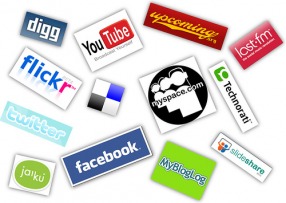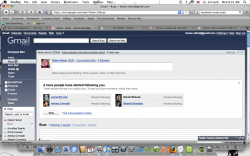For our prospectus (an extensive media kit), I'm writing a description of Better Brunch's social media strategy. My Twitter friends have helped a lot, as has my experience with Newsy. For a monthly magazine, social media can be a bit challenging to cultivate, but I think it's essential for creating a connected readership (also, social media helps magazines gain valuable information about our readers).
Social media for a monthly, or in our case quarterly, mag means content must be insightful and (maybe most importantly) continuous. For instance, Esquire tweeted that it's offering free downloadable songs on its site. This format of content seems to be on the periphery of a print-first magazine, but I think it builds readers' loyalty and, if the readers like the music, trust in Esquire's reviews.
Twitter and Facebook are the obvious choices for our magazine. A Facebook fan page would work almost as an RSS feed for our digital content, and Twitter would help our brand build a personality that not only pushes content, but also interacts with fans, foodies, and other food-related brands. I think some of the most successful interactive brands, like DKNY's PR girl, convey a pride in their product and a touch of humility (as seen in DKNY's willingness to congratulate other brands and discuss competing products).
With Twitter and Facebook, I'd like to develop a Youtube account for the mag on which we'd load videos of recipe demonstrations, decorating tips, etc. I think it would also be cool to develop an entire page (or something) to which readers could submit their own recipes and videos. It would be a kind of user generated community blog, but one that avoids the "message board" feel.
If you have any suggestions or tips, holler at me, gentle readers!
Social media for a monthly, or in our case quarterly, mag means content must be insightful and (maybe most importantly) continuous. For instance, Esquire tweeted that it's offering free downloadable songs on its site. This format of content seems to be on the periphery of a print-first magazine, but I think it builds readers' loyalty and, if the readers like the music, trust in Esquire's reviews.
Twitter and Facebook are the obvious choices for our magazine. A Facebook fan page would work almost as an RSS feed for our digital content, and Twitter would help our brand build a personality that not only pushes content, but also interacts with fans, foodies, and other food-related brands. I think some of the most successful interactive brands, like DKNY's PR girl, convey a pride in their product and a touch of humility (as seen in DKNY's willingness to congratulate other brands and discuss competing products).
With Twitter and Facebook, I'd like to develop a Youtube account for the mag on which we'd load videos of recipe demonstrations, decorating tips, etc. I think it would also be cool to develop an entire page (or something) to which readers could submit their own recipes and videos. It would be a kind of user generated community blog, but one that avoids the "message board" feel.
If you have any suggestions or tips, holler at me, gentle readers!

